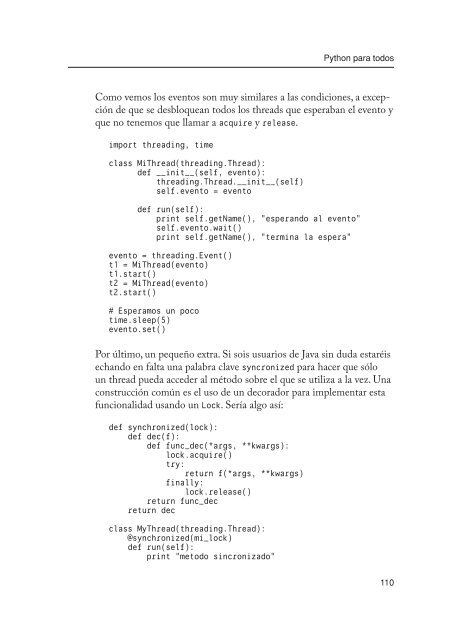Create successful ePaper yourself
Turn your PDF publications into a flip-book with our unique Google optimized e-Paper software.
<strong>Python</strong> <strong>para</strong> <strong>todos</strong><br />
Como vemos los eventos son muy similares a las condiciones, a excepción<br />
de que se desbloquean <strong>todos</strong> los threads que esperaban el evento y<br />
que no tenemos que llamar a acquire y release.<br />
import threading, time<br />
class MiThread(threading.Thread):<br />
def __init__(self, evento):<br />
threading.Thread.__init__(self)<br />
self.evento = evento<br />
def run(self):<br />
print self.getName(), “esperando al evento”<br />
self.evento.wait()<br />
print self.getName(), “termina la espera”<br />
evento = threading.Event()<br />
t1 = MiThread(evento)<br />
t1.start()<br />
t2 = MiThread(evento)<br />
t2.start()<br />
# Esperamos un poco<br />
time.sleep(5)<br />
evento.set()<br />
Por último, un pequeño extra. Si sois usuarios de Java sin duda estaréis<br />
echando en falta una palabra clave syncronized <strong>para</strong> hacer que sólo<br />
un thread pueda acceder al método sobre el que se utiliza a la vez. Una<br />
construcción común es el uso de un decorador <strong>para</strong> implementar esta<br />
funcionalidad usando un Lock. Sería algo así:<br />
def synchronized(lock):<br />
def dec(f):<br />
def func_dec(*args, **kwargs):<br />
lock.acquire()<br />
try:<br />
return f(*args, **kwargs)<br />
finally:<br />
lock.release()<br />
return func_dec<br />
return dec<br />
class MyThread(threading.Thread):<br />
@synchronized(mi_lock)<br />
def run(self):<br />
print “metodo sincronizado”<br />
110


